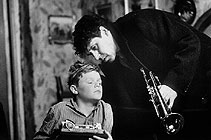|
|
|
|
The
Butcher Boy
|
 |
|
While debates over violence in the cinema have been raging for decades, it has only been recently that movies with serious intentions have started reflecting and worrying over the issue. This year has seen a spate of art movies – The End of Violence (1997), The Boys (1998), Funny Games (1997) and now The Butcher Boy – which present acts of violence in carefully deflected, contextualised and analytical ways. Where some of these films tend to be annoyingly preachy and anodyne, Neil Jordan's The Butcher Boy at least flirts with a slightly immoral thrill. Based on a novel by Patrick McCabe (who co-scripted with Jordan), it presents the odd life of Francie (Eamonn Owens), a spirited and cocky Irish lad who rambles about a terribly depressed and depressing milieu, and develops a deadly hate fixation on the cranky Mrs. Nugent (Fiona Shaw). Jordan refuses to offer up Francie as a victim or bemoan the social conditions around him. Every horrible thing – such as the drunken binges of Francie's father (Stephen Rea) and the death-driven tendencies of his mother (Aisling O'Sullivan) – is presented as a springboard for the boy's wild imaginings, sardonic humour and raucous gestures of rebellion. On many levels, The Butcher Boy seems like a loving tribute to two films: A Clockwork Orange (1971) and Heavenly Creatures (1994). Like Kubrick, Jordan tells a story of a violent, young 'innocent' whose evil, fatal actions paradoxically expose the general stupidity and viciousness of every 'normal' citizen around him. No matter how crazy Francie becomes, Jordan maintains our sympathetic identification with him. Like Peter Jackson, Jordan swathes his small hero in a hallucinatory world of pop songs, TV and movies. In the scary context of the early 1960s and the Bay of Pigs incident, pop culture appears to promote an almost psychotic escape into these kitschy, fantasy realms – rendering even the thought of murder an unreal, high spirited joke. The Butcher Boy is a well-crafted film with many energetically conceived and realised moments. Strikingly surreal touches – as the real world becomes ever more absorbed by Frankie's imagination – proliferate. And Jordan plays some fine games with voice-over narration – at moments adult Francie even converses with young Francie across space and time. So why does the piece as a whole fail to leave a deep impression? Like other Jordan films (The Company of Wolves [1984], Interview with The Vampire [1994]), The Butcher Boy has a static, schematic, academic quality. It sets up its key elements – fantasy, irony, social context – within the first five minutes, and then can do little but repeat them ad nauseam. There is one lesson that Jordan has not yet gleaned from Kubrick: the necessity to periodically alter the premise of a story and move it to a new level of drama or a different mood. Still, any film that offers Sinead O'Connor as a foul-mouthed Virgin Mary, dogging Francie with her unexpected divine visitations, deserves our admiration. MORE Jordan: The Crying Game, In Dreams, Michael Collins, Greta © Adrian Martin July 1998 |
![]()